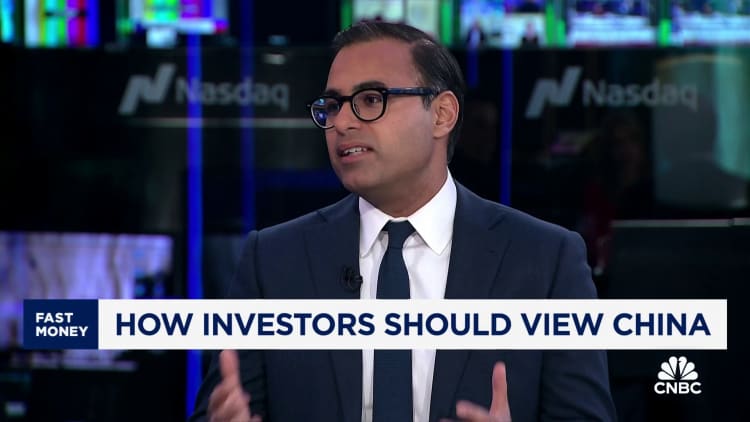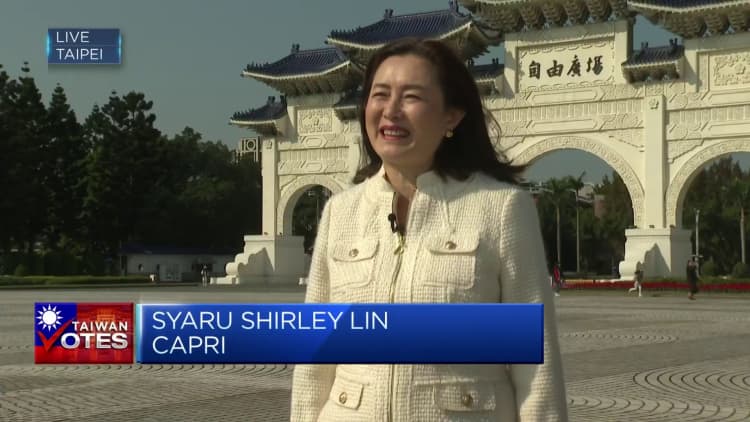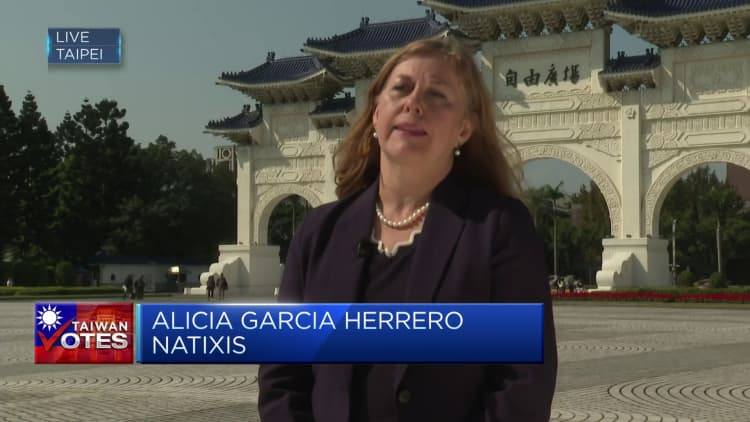Taiwan’s President-elect Lai Ching-te (left) gestures beside his running mate Hsiao Bi-khim during a rally outside the headquarters of the Democratic Progressive Party (DPP) in Taipei on January 13, 2024, after winning the presidential election.
Yasuyoshi Chiba | AFP | Getty Images
TAIPEI — Taiwan’s ruling Democratic Progressive Party won an unprecedented third-straight presidential term, as incoming leader Lai Ching-te pledged to stay open-minded in his approach toward governance, while committing to forging consensus in a split legislature.
The outcome of the presidential election on Saturday riled Beijing, which has repeatedly labeled Lai as a “stubborn worker for Taiwan independence” and a dangerous separatist. There are also fears this could in turn influence frosty China-U.S. relations and security in the broader Indo-Pacific region, with China having escalated military activity in the Taiwan Strait and other nearby waters.
“As president, I have an important responsibility to maintain peace and stability in the Taiwan Straits,” Lai said in a press conference, in an official party translation of his comments in Mandarin. He added though that he is also “determined to safeguard Taiwan from threats and intimidation from China.”
“I will act in accordance with our democratic and free constitutional order, in a manner that is balanced and maintains the cross-Straits status quo,” he added. “Under the principles of dignity and parity, we will use exchanges to replace obstructionism, dialogue to replace confrontation, and confidently present exchanges and cooperation with China.”
The Chinese Communist Party has refused to engage with outgoing President Tsai Ing-wen since she assumed office in 2016. Tsai did not stand at this election because she has served the maximum two presidential terms.
The DPP has not accepted the so-called “1992 Consensus,” disputing the tacit agreement for “one China” between the then-KMT government and Chinese Communist Party officials, which Beijing assumes as the basis for cross-Straits engagement.
Still, in his post-election comments in Mandarin, Lai invoked the official name of Taiwan — the Republic of China — at least twice.
Supporters of the Democratic Progressive party (DPP) await the announcement of official results at a rally on January 13, 2024 in Taipei, Taiwan.
Annabelle Chih | Getty Images News | Getty Images
DPP’s Lai — Taiwan’s current vice-president — won more than 40% of the popular vote in Taiwan’s eighth presidential election. DPP is the first party to win the presidential office three times in row since direct presidential elections were introduced in 1996. Beijing had framed the election as a choice between “peace and war, prosperity and decline.”
Kuomintang or KMT, Beijing’s preferred political partner, gained roughly 33% of the vote with Hou You-yi at the top of its ticket. Ko Wen-je — the surly, straight-talking former Taipei mayor who ran under the banner of the Taiwan People’s Party that was formed only in 2019 — received just over 26% of the vote.
Voter turnout appeared to be the second-weakest since direct presidential elections started in Taiwan in 1996. This year, 71.9% of all eligible voters cast their ballots for the presidential election, according to preliminary data from Taiwan’s Central Election Commission.
Responses from China and the U.S.
China dismissed the outcome of Taiwan’s Saturday elections, saying its ruling Democratic Progressive Party does not represent the mainstream public opinion.
“Taiwan is China’s Taiwan,” Chen Binhua, the spokesperson for the Taiwan Affairs Office of the State Council, said on Saturday shortly after DPP’s Lai emerged as the winner.

“This election cannot change the basic pattern and the development of cross-Strait relations, nor can it change the common desire of compatriots on both sides of the Taiwan Strait to draw closer,” Chen added, according to a CNBC translation of a report from Xinhua, the official state news agency.
China has never relinquished its claim over Taiwan — which has been self-governing since the Chinese nationalist party, or Kuomintang, fled to the island following its defeat in the Chinese civil war in 1949.
Chinese President Xi Jinping regards reunification with the mainland “a historical inevitability.”
The U.S. response starkly differed, but was broadly consistent with its past positions.
“We … congratulate the Taiwan people for once again demonstrating the strength of their robust democratic system and electoral process,” U.S. Secretary of State Antony Blinken said in a statement.
“The United States is committed to maintaining cross-Strait peace and stability, and the peaceful resolution of differences, free from coercion and pressure,” he added.
Commitment to consensus
The outcome of the race to control Taiwan’s 113-seat legislature though is far less clear, with the DPP losing its majority. A hung parliament could well hobble Lai’s policy agenda, while heralding a return of the kind of notorious open feuding among Taiwan’s legislators.
“On the legislative elections, the DPP did not hold onto a majority,” Lai said. “This means we did not work hard enough, and there are areas where we must humbly review and look back on.”
As it stands, the new Taiwan government will have its hands full, with voters largely concerned with bread-and-butter issues, particularly stagnant wages at a time of escalating rents and home prices that have been worsened by high inflation.

These issues have largely helped buoy Ko’s popularity as he positioned himself as a political outsider.
“Taiwan People’s Party got more votes than expected. Ko got 25%, showing there is still a significant number of voters wanting a change,” Wei-Ting Yen, an assistant professor in government at Franklin and Marshall College, told CNBC.
“The social force is there, and the Lai administration has to address the social and economic issues right on,” she said. “People may be supporting the DPP’s foreign policy directions, but they are not necessarily supporting them for domestic policies.”
At the same press conference on Saturday after his two opponents conceded, Lai said he will carefully consider and include policy ideas and positions of his two electoral rivals that further Taiwan’s interests.
In a nod to issues that dominated the presidential election campaign, Lai singled out the financial sustainability of Taiwan’s labor and health insurance, along with the country’s energy transition as urgent issues that he will prioritize in forging consensus.
Lai also said he will appoint the most qualified professionals and personnel regardless of political affiliations in the “spirit of a democratic alliance.”
“The elections have told us that the people expect a strong government and effective checks and balances,” Lai said. “As for the new structure of the new legislature, Taiwan must build a new political environment of communication, consultation, participation, and cooperation.”
Global strategic implications
Still, Lai also had one eye on the broader strategic significance of his electoral victory — however diminished it may seem in comparison to the DPP’s comfortable victory in the presidential and legislative elections in 2016.
“Through our actions, the Taiwanese people have successfully resisted efforts from external forces to influence this election. We trust that only the people of Taiwan have the right to choose their own president,” Lai said.
Taiwan’s DPP-led government has often accused Beijing of vote interference either by military intimidation or by co-opting Taiwan’s business elite due to their economic reliance on China.

In the run-up to Saturday’s vote, Lai said that Beijing’s meddling is “the most serious” at this elections.
Xi told U.S. counterpart Joe Biden on the sidelines of the APEC leaders summit in November that Taiwan has always been the “most important and sensitive” issue in China-U.S. relations.
Prior to Saturday’s elections, a senior Biden administration official said the White House is preparing for several different outcomes. Biden has pledged to defend Taiwan in the event of a China invasion, a position that has irked Beijing.
Former U.S. House Speaker Nancy Pelosi visited Taiwan in 2022, becoming the highest-ranking U.S. official to visit the island in over two decades. Her trip was one reason that communication between the world’s two leading powers ground to a halt before a tentative resumption only months ago.
“As one of the first and most highly anticipated elections of 2024, Taiwan has achieved a victory for the community of democracy,” Lai said. “We are telling the international community that between democracy and authoritarianism, we will stand on the side of democracy.”
Read More: World News | Entertainment News | Celeb News
CNBC










